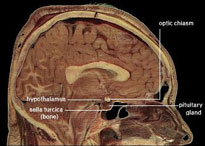New research confirms that acupuncture reduces pain levels. Investigators discovered that electroacupuncture decreases pain by regulating the expression of several proteins in the hypothalamus, a part of the brain responsible for autonomic nervous system, endocrine and limbic system functions. A total of 17 hypothalmic proteins demonstrated significant changes as a result of electroacupuncture stimulation for the treatment of pain.
 The acupuncture points chosen for the study were ST36 (Zusanli) and GB34 (Yanglingquan). Electroacupuncture at these points effectively reduced pain, enriched three gene ontologies and regulated the glycolysis-gluconeogenesis-hexose metabolism pathway. The researchers note that the data demonstrates that electroacupuncture lessens pain through the “regulation of expression of multiple proteins in the hypothalamus.”
The acupuncture points chosen for the study were ST36 (Zusanli) and GB34 (Yanglingquan). Electroacupuncture at these points effectively reduced pain, enriched three gene ontologies and regulated the glycolysis-gluconeogenesis-hexose metabolism pathway. The researchers note that the data demonstrates that electroacupuncture lessens pain through the “regulation of expression of multiple proteins in the hypothalamus.”
These findings are consistent with other research on the relationship between acupuncture and brain chemistry. Researchers discovered that electrical and manual acupuncture “improve menstrual frequency and decrease circulating androgens in women with polycystic ovary syndrome (PCOS).” Acupuncture caused normalization of estrogen activity and decreased excessive androgen levels. Electroacupuncture demonstrated changes in the central opioid receptors of the hypothalamus suggesting that it may be “mediated by central opioid receptors….” Manual acupuncture demonstrated changes in the steroid receptors of the hypothalamus suggesting that it “may involve regulation of steroid hormone-peptide receptors.”
Another study focusing on acupuncture’s ability to reduce carpal tunnel pain discovered a brain pathway by which acupuncture exerts its therapeutic results. The researchers measured brain responses to neuropathic pain using fMRI technology. Acupuncture caused significant activation of the hypothalamus and greater deactivation of the amygdala. The researchers concluded that acupuncture benefits chronic pain sufferers “through a coordinated limbic network including the hypothalamus and amygdala.”
A weight loss study found that acupuncture controls the expression of leptin, a hormone that regulates appetite and metabolism. The investigators observed that “electroacupuncture treatment led to a reduction of body weight, decrease in the plasma leptin levels, and an increase in leptin receptor expression in the hypothalamus.” The researchers continue, “Our results suggested that regulating the expression of leptin and the leptin receptor might be one of the molecular mechanisms underlying the reduction of body weight in diet-induced obese rats by electroacupuncture treatment.”
Similar findings show that acupuncture regulates the hypothalamus-pituitary-adrenal-axis. Researchers discovered that the application of electroacupuncture to acupoint ST36 reduces the production of stress induced hormones via this cortical pathway. Acupuncture prevented sympathetic nervous system elevations via the NPY pathway and also prevented elevations in ACTH and CORT.
Reference:
Gao, Yonghui, Shuping Chen, Qiuling Xu, Kan Yu, Junying Wang, Lina Qiao, Fanying Meng, and Junling Liu. "Proteomic Analysis of Differential Proteins Related to Anti-nociceptive Effect of Electroacupuncture in the Hypothalamus Following Neuropathic Pain in Rats." Neurochemical research (2013): 1-12.
Electrical and manual acupuncture stimulation affects estrous cyclicity and neuroendocrine function in a DHT-induced rat polycystic ovary syndrome model. Yi Feng1,2, Julia Johansson1, Ruijin Shao1, Louise Mannerås Holm1, Håkan Billig1, Elisabet Stener-Victorin1,3 . Experimental Physiology. DOI: 10.1113/expphysiol.2011.063131.
PAIN. Volume 130, Issue 3 , Pages 254-266, August 2007. Hypothalamus and amygdala response to acupuncture stimuli in carpal tunnel syndrome. V. Napadow, N. Kettner, J. Liu, M. Li, K.K. Kwong, M. Vangel, N. Makris, J. Audette, K.K.S. Hui. July 2006.
Meirong Gong et al, Am. J. Chin. Med. 40, 511 (2012). DOI: 10.1142/S0192415X12500395. Effect of Electroacupuncture on Leptin Resistance in Rats with Diet-Induced Obesity. Meirong Gong. Xinjun Wang. Zhen Mao. Qinhua Shao. Xiaoren Xiang. Bin Xu. Department of Acupuncture and Moxibustion, Nanjing University of Traditional Chinese Medicine, Nanjing, China.
Eshkevari, Ladan, Eva Permaul, and Susan Elisabeth Mulroney. "Acupuncture Blocks Cold Stress-Induced Increase in Hypothalamus-Pituitary-Adrenal Axis in Rat." Journal of Endocrinology (2013).

